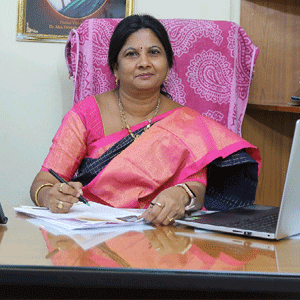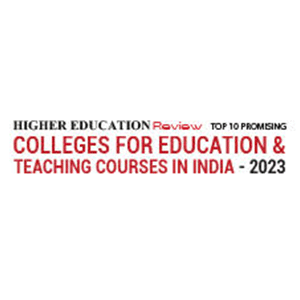
College Of Teacher Education, Andhra Mahila Sabha: Empowering Educators With Tomorrow's Skills
By Dr. G . Indira, Principal
The inception of the College of Teacher Education, Andhra Mahila Sabha, traces its roots back to the relentless dedication and dynamic leadership of Padma Vibhushan Dr. Durgabai Deshmukh. Recognized as the Founder President of AMS, the first voluntary organization in India advocating for women's empowerment, Dr. Deshmukh established this college in 1971. The journey began with acquiring permissions from the Government of Andhra Pradesh and securing affiliation with Osmania University.
Over the years, the college evolved, earning recognition as a College of Teacher Education (CTE), a rare distinction for a private aided institution, thus expanding its responsibilities beyond teacher training to encompass orientation programs, content enrichment initiatives, workshops, seminars, and research projects.
One notable facet setting the College of Teacher Education, Andhra Mahila Sabha, apart from other educational institutions in the state is its unwavering commitment to maintaining high-quality education tailored to societal needs. It stands distinguished for several noteworthy achievements, including being the sole recipient of assistance under COSSHIP and receiving aid for Restructured Courses under the Faculty of Education at Osmania University.
Additionally, it was the pioneering institution in the voluntary sector to secure a project from UNICEF via NCERT, culminating in the establishment of the State Resource Centre (SRC) in Early Childhood Education (ECE) in Andhra Pradesh.
Padma Vibhushan Dr. Durgabai Deshmukh's visionary aspirations led to the establishment of numerous institutions, including the College of Teacher Education, Andhra Mahila Sabha. Her dream, as she expressed, was to create a comprehensive educational continuum where a girl starting her educational journey in Mahila Sabha at the nursery stage could culminate it with a B.Ed. course.
Delving into the milestones achieved by the institution, its trajectory is marked by significant accomplishments. From securing grants and introducing unique programs like the P.G. Diploma in Early Childhood Education recognized by the UGC to being identified as a state resource center for early childhood education by UNICEF, the college has consistently set benchmarks in education. The journey continued with the introduction of various programs, attaining autonomous status, accreditation from NAAC, and conducting numerous seminars, workshops, and conferences catering to the educational needs of the society.
Celebrating its 50 years of existence from 1971 to 2023, the College of Teacher Education, Andhra Mahila Sabha, has crafted a distinctive identity in the realm of teacher education. Its commitment to addressing the dynamic needs of society has firmly established its brand, setting a remarkable standard in the educational landscape.
AMS CTE actively endeavors to elevate educational standards through various strategies. Rooted in the visionary ideals of its Founder, the institution emphasizes a value system deeply ingrained in its ethos. Program differentiation stands as a hallmark, promoting diverse academic pursuits. Actively engaging students in both curricular and co-curricular activities enriches their learning experience. The college champions digital transformation, maximizing resource utilization for enhanced learning.
It embraces contemporary teaching methodologies and offers scenario-based learning options, while closely monitoring student performance to facilitate informed decision-making. The institution constantly refines course structures to align with evolving student needs and ensures smooth communication channels for seamless information flow. AMS CTE nurtures teachers, fostering commitment, integrity, creativity, and innovation, instilling the right values, attitudes, and interests in aspiring educators.
Furthermore, the college tackles critical educational challenges by striving to reduce disparities in access to education. It continuously enhances curricula through innovative teaching methods and offers guidance and counseling via mentoring programs. The institution extends certificate courses and provides online education specifically tailored for ECCE students.
Employing Task-Based Learning through projects, integrating ICT in language and computer laboratories, and fostering the Student Quality Circle optimize resource utilization. Annual job melas, creative collaborative learning approaches, training in cultural competencies, establishment of a redressal and grievance cell, and promoting personal responsibility and initiatives are among the various initiatives the college employs to address these challenges.
The college provides an array of courses spanning from Early Childhood Education to post-graduation, aligning closely with NEP 2020 guidelines. Through a memorandum of understanding with PMSL - DPS, it offers a three-month certificate course in ECCE. Additionally, the institution has revamped its curriculum to address 21st-century skill requirements. To bolster students' professional capabilities, a digitalized library equipped with Koha Software and INFLIBNET services is available for every course. Moreover, students engage in a school observation project, gaining insights into the intricacies of the teaching-learning process.
Classroom seminars, assignments, project presentations, and internal evaluations form integral components enhancing students' mastery of subject matter. The institution focuses on honing abilities and offers value-added courses to foster self-confidence and develop interpersonal skills. Furthermore, students gain practical experience through internships in standard schools, supervised regularly by Methods Masters.
Embracing Gandhi Bhavan programs, the college instills Gandhian ethos and spiritual values in its students. National and International day celebrations contribute to the development of presentation and communicative skills. The provision of guest and extension lectures across various subjects enriches students' knowledge base. Embracing innovative teaching methods like flipped classrooms, blended learning, project-based problem-solving, design thinking, cooperative learning, and the jigsaw approach reflects a dynamic shift toward a constructivist educational approach.
The Andhra Mahila Sabha College of Teacher Education maximizes encountered opportunities to enhance the quality of education provided. Supported by a conducive social environment, community involvement, student enthusiasm, and faculty commitment, our focus remains on serving the community, especially women. It aims to introduce more job-centric courses catering to community needs while upholding unparalleled quality.
Emphasis is placed on augmenting student capabilities through diverse learning methods such as group and individual presentations, reflective documentation, workshops, and tutorials. The curriculum is crafted with a keen eye on innovation and local requirements.
“The vision of the Founder was to see the institution grow into an institute of excellence in teacher education. The management leaves no stone unturned to materialize her vision. However, students should not treat courses in teacher education as a stop-gap arrangement, and the government should support the institution in all ways”, signs off Dr. G. Indira, Principal, AMS.
Over the years, the college evolved, earning recognition as a College of Teacher Education (CTE), a rare distinction for a private aided institution, thus expanding its responsibilities beyond teacher training to encompass orientation programs, content enrichment initiatives, workshops, seminars, and research projects.
One notable facet setting the College of Teacher Education, Andhra Mahila Sabha, apart from other educational institutions in the state is its unwavering commitment to maintaining high-quality education tailored to societal needs. It stands distinguished for several noteworthy achievements, including being the sole recipient of assistance under COSSHIP and receiving aid for Restructured Courses under the Faculty of Education at Osmania University.
Additionally, it was the pioneering institution in the voluntary sector to secure a project from UNICEF via NCERT, culminating in the establishment of the State Resource Centre (SRC) in Early Childhood Education (ECE) in Andhra Pradesh.
Padma Vibhushan Dr. Durgabai Deshmukh's visionary aspirations led to the establishment of numerous institutions, including the College of Teacher Education, Andhra Mahila Sabha. Her dream, as she expressed, was to create a comprehensive educational continuum where a girl starting her educational journey in Mahila Sabha at the nursery stage could culminate it with a B.Ed. course.
Delving into the milestones achieved by the institution, its trajectory is marked by significant accomplishments. From securing grants and introducing unique programs like the P.G. Diploma in Early Childhood Education recognized by the UGC to being identified as a state resource center for early childhood education by UNICEF, the college has consistently set benchmarks in education. The journey continued with the introduction of various programs, attaining autonomous status, accreditation from NAAC, and conducting numerous seminars, workshops, and conferences catering to the educational needs of the society.
Celebrating its 50 years of existence from 1971 to 2023, the College of Teacher Education, Andhra Mahila Sabha, has crafted a distinctive identity in the realm of teacher education. Its commitment to addressing the dynamic needs of society has firmly established its brand, setting a remarkable standard in the educational landscape.
Empowering Education
AMS CTE actively endeavors to elevate educational standards through various strategies. Rooted in the visionary ideals of its Founder, the institution emphasizes a value system deeply ingrained in its ethos. Program differentiation stands as a hallmark, promoting diverse academic pursuits. Actively engaging students in both curricular and co-curricular activities enriches their learning experience. The college champions digital transformation, maximizing resource utilization for enhanced learning.
It embraces contemporary teaching methodologies and offers scenario-based learning options, while closely monitoring student performance to facilitate informed decision-making. The institution constantly refines course structures to align with evolving student needs and ensures smooth communication channels for seamless information flow. AMS CTE nurtures teachers, fostering commitment, integrity, creativity, and innovation, instilling the right values, attitudes, and interests in aspiring educators.
Furthermore, the college tackles critical educational challenges by striving to reduce disparities in access to education. It continuously enhances curricula through innovative teaching methods and offers guidance and counseling via mentoring programs. The institution extends certificate courses and provides online education specifically tailored for ECCE students.
Employing Task-Based Learning through projects, integrating ICT in language and computer laboratories, and fostering the Student Quality Circle optimize resource utilization. Annual job melas, creative collaborative learning approaches, training in cultural competencies, establishment of a redressal and grievance cell, and promoting personal responsibility and initiatives are among the various initiatives the college employs to address these challenges.
Comprehensive Educational Offerings
The college provides an array of courses spanning from Early Childhood Education to post-graduation, aligning closely with NEP 2020 guidelines. Through a memorandum of understanding with PMSL - DPS, it offers a three-month certificate course in ECCE. Additionally, the institution has revamped its curriculum to address 21st-century skill requirements. To bolster students' professional capabilities, a digitalized library equipped with Koha Software and INFLIBNET services is available for every course. Moreover, students engage in a school observation project, gaining insights into the intricacies of the teaching-learning process.
Classroom seminars, assignments, project presentations, and internal evaluations form integral components enhancing students' mastery of subject matter. The institution focuses on honing abilities and offers value-added courses to foster self-confidence and develop interpersonal skills. Furthermore, students gain practical experience through internships in standard schools, supervised regularly by Methods Masters.
Embracing Gandhi Bhavan programs, the college instills Gandhian ethos and spiritual values in its students. National and International day celebrations contribute to the development of presentation and communicative skills. The provision of guest and extension lectures across various subjects enriches students' knowledge base. Embracing innovative teaching methods like flipped classrooms, blended learning, project-based problem-solving, design thinking, cooperative learning, and the jigsaw approach reflects a dynamic shift toward a constructivist educational approach.
Path Ahead
The Andhra Mahila Sabha College of Teacher Education maximizes encountered opportunities to enhance the quality of education provided. Supported by a conducive social environment, community involvement, student enthusiasm, and faculty commitment, our focus remains on serving the community, especially women. It aims to introduce more job-centric courses catering to community needs while upholding unparalleled quality.
Emphasis is placed on augmenting student capabilities through diverse learning methods such as group and individual presentations, reflective documentation, workshops, and tutorials. The curriculum is crafted with a keen eye on innovation and local requirements.
“The vision of the Founder was to see the institution grow into an institute of excellence in teacher education. The management leaves no stone unturned to materialize her vision. However, students should not treat courses in teacher education as a stop-gap arrangement, and the government should support the institution in all ways”, signs off Dr. G. Indira, Principal, AMS.


